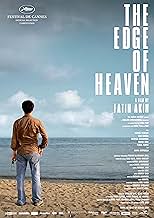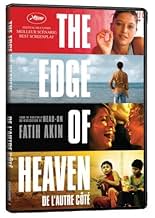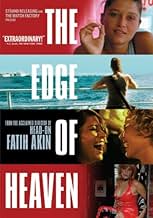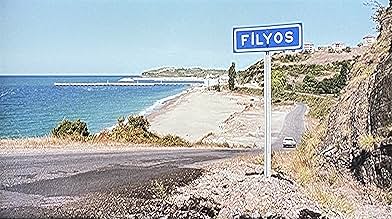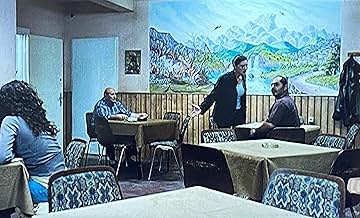VALUTAZIONE IMDb
7,7/10
34.937
LA TUA VALUTAZIONE
Un uomo turco si reca a Istanbul per trovare la figlia dell'ex fidanzata di suo padre.Un uomo turco si reca a Istanbul per trovare la figlia dell'ex fidanzata di suo padre.Un uomo turco si reca a Istanbul per trovare la figlia dell'ex fidanzata di suo padre.
- Regia
- Sceneggiatura
- Star
- Premi
- 37 vittorie e 22 candidature totali
Recensioni in evidenza
Faith Akin, renowned for his energetic movie 'Gegen die Wand', brings another story about the Turkish-German community. The movie focuses on three families who are all connected in some way. In a beautiful way Akin shows the struggle of a Turkish prostitute, a professor of German literature, a young Turkish rebel, a student English and Spanish and a retired widower to find peace and happiness in their lives. Akin manages to avoid the many pitfalls which can lead to clichés. The characters remain just ordinary people with genuine emotions and problems. The movie also depicts the impact of globalization and multiculturalism in nowadays Germany and Turkey. It's the most debated topic of our time. To what extent do we want newcomers to adapt to their new surroundings and to what extent do we accept them to cherish their own cultural heritage. In an even broader perspective, it deals with the clash between the Islamic and western world. 'Auf der anderen Seite', which means on the other side, shows how Turkish immigrants come to love their new country, Germany, without losing their Turkish roots. I think Akin invites us to try and imagine the backgrounds of people, so there will be less misunderstanding. This view is symbolized by Lotte, a German student, who decides to help Ayten, a Turkish political activist who fled Turkey. She doesn't know the Turkish girl but just wants to help her, because the girl has nowhere to go. This quest even brings her to the shores of Istanbul, a city where East meets West in the most literal way.
In the end, 'Auf der anderen Seite' is a story of love and hope which is most endearing and sheds a refreshing light on the global trend of clashing cultures. Any one who is interested in these topics and just loves a very well made movie, ought see this German-Turkish production!
In the end, 'Auf der anderen Seite' is a story of love and hope which is most endearing and sheds a refreshing light on the global trend of clashing cultures. Any one who is interested in these topics and just loves a very well made movie, ought see this German-Turkish production!
"Auf der anderen Seite" is the first Faith Akin-movie I have seen, and I was surprised by how balanced and mature it was. Looking at Akin's young age and the "gang"-background of his youth, I was expecting something much louder, more brutal, more explicit, more devastating. What "Auf der anderen Seite" is, is a deeply humanistic and thoughtful movie.
The thing that I loved most about it, is that every single character is written so well. No one is a villain or a bad person per se, they're all just human, struggling to do what they think is right. The actors and actresses portraying these characters are fabulous. I've rarely seen such convincing and natural performances.
Finally, the story itself is original, unagitated and beautiful. The individual plot lines don't come together as you think they would or as you think it might be best for the characters. When the movie ends, you will find that everything did resolve in a way. It's hard to explain it, if you haven't seen it. Let's just say this: "Auf der anderen Seite" doesn't have the average Hollywood-solution, but it will leave you with a lot to think about when the credits quietly start running.
This movie really impressed me, and I can't wait to finally see Akin's other works. Apparently Germany's finally got a really interesting filmmaker deserving of all the praise he gets.
The thing that I loved most about it, is that every single character is written so well. No one is a villain or a bad person per se, they're all just human, struggling to do what they think is right. The actors and actresses portraying these characters are fabulous. I've rarely seen such convincing and natural performances.
Finally, the story itself is original, unagitated and beautiful. The individual plot lines don't come together as you think they would or as you think it might be best for the characters. When the movie ends, you will find that everything did resolve in a way. It's hard to explain it, if you haven't seen it. Let's just say this: "Auf der anderen Seite" doesn't have the average Hollywood-solution, but it will leave you with a lot to think about when the credits quietly start running.
This movie really impressed me, and I can't wait to finally see Akin's other works. Apparently Germany's finally got a really interesting filmmaker deserving of all the praise he gets.
In his film The Edge of Heaven (2007), under original title Auf der anderen Seite (On the Other Side), Fatih Akin, a German writer-director of Turkish parentage, intertwines two stories, whose protagonists get caught in seemingly hopeless situations, both resulting in individual tragedies, stories with a cross section on the character of a young Turkish German professor, Nejat Aksu (Baki Davrak) whom we first meet living in Bremen and lecturing in the German literature university classes, who returns to Turkey, on a (futile?) quest for the lost daughter of his father's suddenly deceased girlfriend, and (unexpectedly?) stays there where he, quite appropriately to his vocation and interests, buys and maintains an Istanbul bookstore with exclusively German books (or books translated in to German) on offer, two stories which gradually approximate each other, but never actually "resolve" one in to another. Still, the end is open, with the possibility for resolution, future cleansing what-so-ever, of the souls heavily burdened with guilt from the past.
Film touches real life situations, ranging from usual family tensions and quarrels, through losses suffered due to physical separation or emotional disorder, all the way to ultimate loss, death of the dear one, and in doing so engages audiences on the first-person level, because nobody is spared from at least a single such experience, or two or more. Such an easy and deep identification with on-screen happenings, with how they develop, how they are mended or not... is what we feel all along, and what we carry out of the theatre when the film is over... Split between two sides, Life and Death on the edge, but who's to tell which side is the Heaven and which one is the Hell?
Heavy matters tackled, yet easy to relate to, feel for affected characters and empathize with them, in an emotionally charged and very engaging film.
Film touches real life situations, ranging from usual family tensions and quarrels, through losses suffered due to physical separation or emotional disorder, all the way to ultimate loss, death of the dear one, and in doing so engages audiences on the first-person level, because nobody is spared from at least a single such experience, or two or more. Such an easy and deep identification with on-screen happenings, with how they develop, how they are mended or not... is what we feel all along, and what we carry out of the theatre when the film is over... Split between two sides, Life and Death on the edge, but who's to tell which side is the Heaven and which one is the Hell?
Heavy matters tackled, yet easy to relate to, feel for affected characters and empathize with them, in an emotionally charged and very engaging film.
So many films tell bland stories based on clichéd characters, whose ultimate destiny is established in the first tracking shot. But this intelligent film is based on a set of interesting individuals whose evolving personal histories quietly command attention. There's an elderly Turkish man, living in Germany, capable of both gentlemanly and violent behaviour; his son, successful but shy and unconnected to those around him; the prostitute he takes as a substitute for a wife; her politically radical daughter; the German student that the daughter falls for; and the student's mother, a conservative hausfrau with a less conservative past. Their lives intersect, but messily, not neatly, and director Faith Akin chooses to end his film before being forced to a near resolution. The film doesn't exactly make you sit on the edge of your seat; but it feels both true to life and utterly personal. It's a thoughtful movie in the best sense of that word.
A German filmmaker with Turkish extraction, Faith Akin's fifth feature, a Cannes' BEST SCREENPLAY winner, THE EDGE OF HEAVEN is a Bremen-Istanbul bilateral drama, unfolds in a triptych structure, delineates the vagaries of destiny and incidents impinged upon three parent- offspring pairs: a Turkish professor of German literature Nejat Aksu (Davrak) and his widowed pensioner father Ali (Kurtiz) living in Bremen, the latter, meets a middle-aged Turkish prostitute Yeter (Köse), and decides to pay her to live in with him as his exclusive possession, Yeter misses her daughter Ayten (Yesilçay) in Istanbul, whom she hasn't been in contact for years and later we will learn that she is now a young anti-government firebrand, the final pair is Lotte (Ziolkowska), a German college student who falls in love with Ayten and her mother Susanne (Schygulla), who doesn't quite approve of their lesbian romance and Ayten's radical political stance.
With each of the triptych respectively named as: Yeter's death, Lotte's death, and the eponymous The Edge of Heaven, Akin presages the tragedies in the first two segments like a hanging rock, leaving audience hooked by the impending demise, it is a bold move to dispel suspense and foreground the inevitability in its fair-paced narrative which evinces of Akin's more restrained sobriety over his material and the disparities underlying the two very different countries (both segments opens with protests, one in Bremen, another in Istanbul, their different after-effects tellingly betray Akin's political inclination). But, what renders wholesome of the film's slightly fortuity-heavy story is Akin's reflective and unflinchingly humane dissection of his dramatis personae, they are all the garden-variety type, each tries their best to get hold of their lives in the best possible way, and each is undermined by their foibles, but in its praise of love (Ayten and Lotte's intense love transcends their different mother tongues), family (Yeter's death separates Nejat and Ali, whereas Lotte's death unites Susanne with Ayten), understanding (Susanne's lofty gesture to the girl who obliquely causes the death of her daughter), and forgiveness (the childhood memory prompts Nejat to look for Ali in the end), that finale really vouches for the film's title, heaven is not afar in spite of there is turmoil prevalent on the surface, humanity can prevail.
Wonderful performances from the central sextet, in the (borderline) leading part, Davrak emanates an aura of soothing kindness often outdoes what he is required by the script and Turkish name-star Yesilçay mounts a great deal of rawness and bluntness in her deglamorized commitment, whereas Köse and Ziolkovska, due to their characters' preordained fate, are the ones to proffer ample sympathy. As for the two veterans, the late Turkish triple-threat Kurtiz trades on a spot-on brazenness of senescent loneliness and obstinacy, and Schygulla, staggeringly holds court as the redeeming soul who gets over from a sad bereavement and carries on with a positive vibe, which is so powerful and contagious, that fly-on-the-wall observation of her wailing in the hotel room is tremendously devastating to watch.
After his astounding one-two punch HEAD-ON (2004) and this, in retrospect, the following decade surprisingly hasn't panned out as a substantial acclivity for this wunderkind cineaste (he was only 34 at that time) as one might have postulated, his track record after THE EDGE OF HEAVEN is a lukewarm comedy SOUL KITCHEN (2009), an atrocious misfire THE CUT (2014) and his latest GOODBYE BERLIN (2016), almost gets no traction upon its release in the international front. Will Akin find his mojo back? It will be a crying shame if a filmmaker of his credentials cannot achieve something significantly great.
With each of the triptych respectively named as: Yeter's death, Lotte's death, and the eponymous The Edge of Heaven, Akin presages the tragedies in the first two segments like a hanging rock, leaving audience hooked by the impending demise, it is a bold move to dispel suspense and foreground the inevitability in its fair-paced narrative which evinces of Akin's more restrained sobriety over his material and the disparities underlying the two very different countries (both segments opens with protests, one in Bremen, another in Istanbul, their different after-effects tellingly betray Akin's political inclination). But, what renders wholesome of the film's slightly fortuity-heavy story is Akin's reflective and unflinchingly humane dissection of his dramatis personae, they are all the garden-variety type, each tries their best to get hold of their lives in the best possible way, and each is undermined by their foibles, but in its praise of love (Ayten and Lotte's intense love transcends their different mother tongues), family (Yeter's death separates Nejat and Ali, whereas Lotte's death unites Susanne with Ayten), understanding (Susanne's lofty gesture to the girl who obliquely causes the death of her daughter), and forgiveness (the childhood memory prompts Nejat to look for Ali in the end), that finale really vouches for the film's title, heaven is not afar in spite of there is turmoil prevalent on the surface, humanity can prevail.
Wonderful performances from the central sextet, in the (borderline) leading part, Davrak emanates an aura of soothing kindness often outdoes what he is required by the script and Turkish name-star Yesilçay mounts a great deal of rawness and bluntness in her deglamorized commitment, whereas Köse and Ziolkovska, due to their characters' preordained fate, are the ones to proffer ample sympathy. As for the two veterans, the late Turkish triple-threat Kurtiz trades on a spot-on brazenness of senescent loneliness and obstinacy, and Schygulla, staggeringly holds court as the redeeming soul who gets over from a sad bereavement and carries on with a positive vibe, which is so powerful and contagious, that fly-on-the-wall observation of her wailing in the hotel room is tremendously devastating to watch.
After his astounding one-two punch HEAD-ON (2004) and this, in retrospect, the following decade surprisingly hasn't panned out as a substantial acclivity for this wunderkind cineaste (he was only 34 at that time) as one might have postulated, his track record after THE EDGE OF HEAVEN is a lukewarm comedy SOUL KITCHEN (2009), an atrocious misfire THE CUT (2014) and his latest GOODBYE BERLIN (2016), almost gets no traction upon its release in the international front. Will Akin find his mojo back? It will be a crying shame if a filmmaker of his credentials cannot achieve something significantly great.
Lo sapevi?
- QuizNurgül Yesilçay - who is a big star in her native Turkey - had doubts about taking on the part of Ayten as she wasn't sure how audiences would react to seeing her as a revolutionary lesbian.
- BlooperIn the film, the year is 2006 and it is the Festival of Sacrifices (Kurban Bayrami), a religious holiday. Everybody is in summer clothes and many of them are sweating. The Festival of Sacrifices in 2006 in Turkey was in winter, at the end of December.
- Citazioni
story: After telling the story of Abraham that was willing to sacrifice his son, Ismael, to show God his obedience. Before Abraham could slay his son God sent a lamb to sacrifice instead.
Nejat Aksu: I asked my dad if he would have sacrificed me as well.
Susanne Staub: And what did he say?
Nejat Aksu: That he would even make an enemy of God to protect me.
- Curiosità sui creditiThe film's title appears twice: in the middle of the film at 1 hour 25 mins and after the end credits.
- ConnessioniFeatured in Fatih Akin - Tagebuch eines Filmreisenden (2007)
I più visti
Accedi per valutare e creare un elenco di titoli salvati per ottenere consigli personalizzati
- How long is The Edge of Heaven?Powered by Alexa
Dettagli
- Data di uscita
- Paesi di origine
- Siti ufficiali
- Lingue
- Celebre anche come
- The Edge of Heaven
- Luoghi delle riprese
- Aziende produttrici
- Vedi altri crediti dell’azienda su IMDbPro
Botteghino
- Lordo Stati Uniti e Canada
- 742.349 USD
- Fine settimana di apertura Stati Uniti e Canada
- 14.257 USD
- 25 mag 2008
- Lordo in tutto il mondo
- 17.804.565 USD
- Tempo di esecuzione
- 1h 56min(116 min)
- Colore
- Mix di suoni
- Proporzioni
- 1.85 : 1
Contribuisci a questa pagina
Suggerisci una modifica o aggiungi i contenuti mancanti



